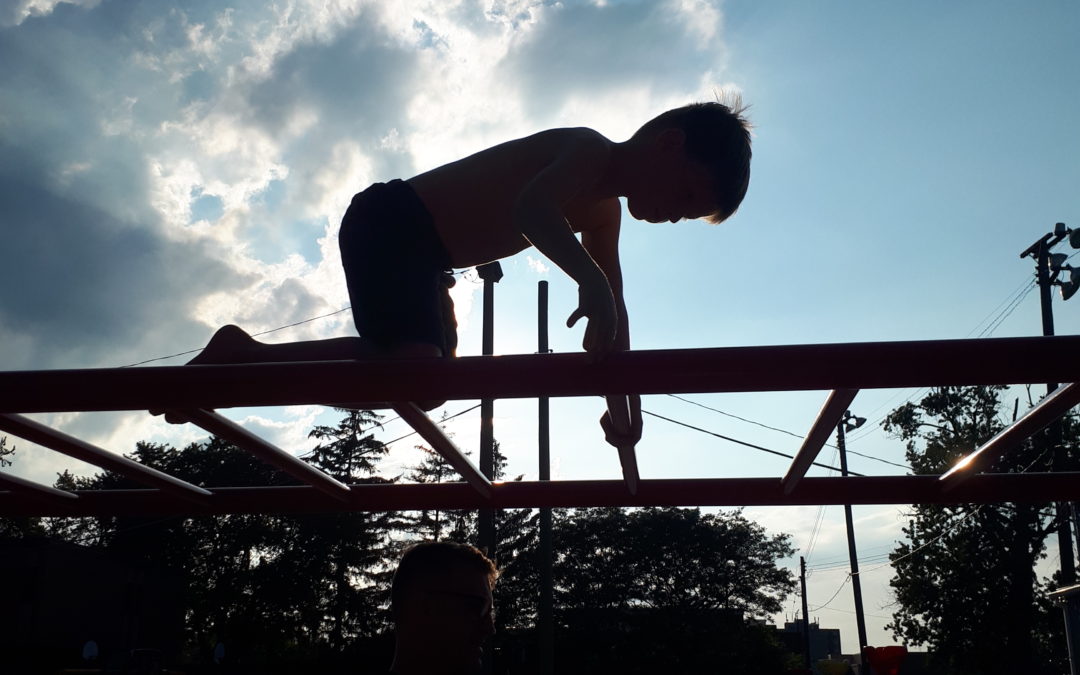“I don’t have to do anything!”, my seven year old gleefully shouts while spinning in circles in our backyard. My eldest of three, he is an individual who is far more physically and emotionally literate than I’ve ever been. He and his two siblings have been raised in an environment that I once would have equated with a strange and uncomfortable form of neglect: no rules, no punishments, no school, no power struggles, no requirements outside of physical and emotional safety. And even safety looks different for him than it ever looked for me.
He runs up a ‘ramp’ of two 10’ long 2x4s, which he bungeed together himself, touching ground at one end and the roof of an old play house at the other. It’s about five feet high and he climbs it with no hands, with obvious confidence and something similar to respect for it. My two year old waits patiently at the bottom of the ramp, understanding from past experience that to go up at the same time as her brothers means it will be significantly wobblier and therefore beyond her own comfort level and skill set. None of this was instructed; there was at no point any announcements of “careful!” or “wait your turn!”. Of course, this is no easy task for a woman who was raised (lovingly) to respect rules, other’s expectations, and above all, the judgements of adults who “know better”. My son suddenly stops climbing. “I don’t have to do anything at all, mom. But if I want to, I can.”
My middle kid, 4 years old, is trying to figure out how to create a zip line for his stuffed animals. The highest point is about 7 feet up a tree, and runs down about 30 feet away to the base of another tree. He had been using a project ladder to tie the rope at the top, but it wasn’t as tall as he wanted it to be. My eldest called out to him, “THE POOL LADDER!” This type of thing is where I’m usually summoned. This is my moment to take on the role of facilitator (which is the role I embody far more often than ‘parent’ or ‘teacher’). We remove the ladder from the above ground pool and drag it over to the tree. Success! Much taller! “Mommy, I don’t have to do anything at all, but I choose to do lots of things to help. I’m very smart.” He’s not wrong.
I often wonder what life would look like if we adults had been able to so confidently state, “I CHOOSE TO DO THIS BUT I DON’T HAVE TO!” What would our lives look like if we had learned early on that everything we do in this life is a choice – even the things we ‘have’ to do – and we have infinite options and endless potential? What would life look like if we had learned through experience that we are safe, supported, loved unconditionally, and above all, free?
As an unschooling family, we are often asked (through panicked voices), “How will they get a job? How will they know to respect authority? How will they know to clean up? How will they ever go to bed OH MY GOD WHEN WILL THEY GO TO BED?!” But the thing we’ve learned as unschoolers (which is not simply an education alternative, but an entire way of living life) is that given the opportunity, life will guide us without too much effort involved. All the energy so many of us put into forcing bedtimes and healthy meals, or enforcing and monitoring time outs…it’s there for us to use as a life force. The lessons come regardless. We learn naturally. We naturally learn that we feel like garbage when we eat garbage. We feel exhausted when we don’t sleep. We feel empty when our brains are empty. We feel uninspired to play (which is a major part of how we learn) when the mess is bigger than the game…so we sleep, we eat, we learn, we clean. Because we choose to. My kids aren’t forced to do anything so there are very few power struggles, and instead my energy goes toward loving them, loving life, and thriving in my own body.
My eldest walks away from the ladder and tree and starts spinning again. “Mom, after I”m done this, can you teach me how to build a catapult?” It not always easy, its rarely predictable, but I wouldn’t change our way of life for anything.
Written by Danielle Onward


Beautiful! It reminds me of the notion of “natural consequences”, which in practice are not natural at all. And yet truly natural consequences (a wobbly balance beam, a messy play space that gets in the way of play) are contributors to learning. If we all had the freedom to learn naturally and the perspective that we do truly have choice, I think we’d surprise ourselves!
I love that idea of ‘truly natural consequences’ being contributors to learning. And I too think we’d surprise ourselves!!